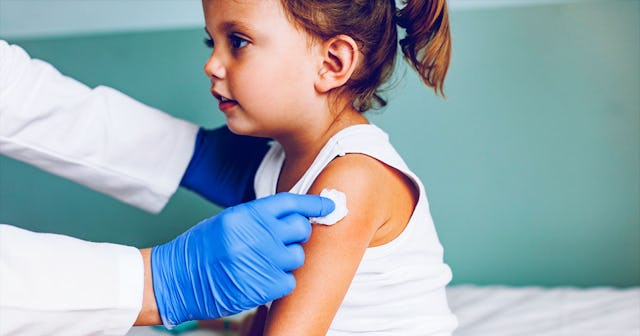Yes, Kids Need A COVID-19 Vaccine Too

As we enter the ninth month of the coronavirus pandemic in the United States, the vaccine for COVID-19 is finally here. The U.K has approved Pfizer’s COVID-19 vaccine and is already distributing it to priority populations. In the U.S., the vaccine was approved last week by the Food and Drug Administration, and the first rounds of vaccinations have begun. And as numbers surpass 15 million confirmed cases here in the U.S., it can’t happen fast enough.
Initial distribution of the vaccine will be based on the recommendations of the CDC’s Advisory Committee on Immunization Practices. It will start with healthcare workers most at risk for exposure to COVID-19 and residents of long-term-care facilities. Next in line are essential workers in “critical” industries, those with high risk due to underlying medical conditions and people 65 years and older. Distribution to the remaining population will then be determined by the states.
And yes, kids will need to get the COVID vaccine too.
But before you go getting your panties in a bunch … kids will not be a part of the first rounds of vaccination. Clinical trials for adolescents have just begun. Pfizer announced in October that they began testing their vaccine on children as young as 12. Moderna, the other leading vaccine maker, announced they have recently begun clinical trials for adolescents ages 12-17 soon. And both companies have yet to begin testing on infants, toddlers and kids under the age of 12. So vaccinations for kids will most likely not be available till the later part of 2021.
Then why do we need to start this discussion now? It’s no secret that vaccines have been a long-time, hotly-debated topic in the parenting arena. And with all the false anti-vaccination information out there, it is completely understandable that parents are leery of a brand new vaccine that has been fast tracked by the federal government.
The majority of people understand that vaccines are not bad. They stimulate the immune system to develop antibodies and in turn, immunity to the disease without actually getting the disease. And most vaccines have a pretty good track record when it comes to eradicating or diminishing the effects of a disease on a population. Let’s not forget about measles, mumps, polio, pertussis (whooping cough), and rubella (German measles) just to name a few.
Why are vaccines important? They are key to herd immunity. I am pretty sure most people have an understanding of the importance of herd immunity. But, I am going to explain it for those who may not understand (and those that refuse to).
Rob Lewine/Getty
WHO defines herd immunity as, “a concept used for vaccination, in which a population can be protected from a certain virus if a threshold of vaccination is reached.” And there are two paths to herd immunity; infection and vaccination. Based on what we have seen with this pandemic up to this point, I am going to guess that achieving herd immunity through infection is not really a viable option.
There are arguments that kids do not need a COVID vaccine. But we have to look at the facts. According to the American Association of Pediatrics, over 1.4 million children have tested positive for COVID-19, representing 12% of documented cases in the U.S. And one-fifth of the U.S. population is made up of children under the age 18. A subset of the population that size can play a significant role in herd immunity.
AAP President Sally Goza agrees that kids need a COVID vaccine. She voiced her concern about the lack of pediatric trials for the COVID-19 vaccine in a letter to federal leaders Alex Azar, Secretary of the U.S. Department of Health and Human Services, and FDA Commissioner Stephen Hahn. Goza stated, “While the likelihood of spreading the disease may vary among different aged children, we know that children can and do spread the virus to household members, grandparents, teachers, and other children.”
Besides the fact that kids need to be vaccinated for us to achieve herd immunity and protect our more vulnerable citizens, the fact is that kids are not immune to COVID and and can get sick — sometimes very sick. In May, the CDC issued a health advisory warning health providers of “multisystem inflammatory syndrome in children (MIS-C) associated with coronavirus disease 2019 (COVID-19).”
MIS-C is an inflammatory illness that can cause various body parts to become inflamed, including organs. For some kids, this means they will need to be hospitalized for supportive measures. And as of December, 23 deaths have been reported. This is a terrifying possibility for parents of children with asthma, congenital heart defects, lung disease and a myriad of other health issues.
In addition to MIS-C, kids, like adults, can become COVID-19 “long haulers,” meaning that they can experience symptoms like exhaustion, shortness of breath, and neurological symptoms for months on end. This is terrifying.
You may believe the world is overacting to COVID-19. However, you can’t deny that this is a scary disease with very real consequences like death and long-term medical complications — not just for adults, but for kids as well. Without herd immunity, people are going to continue to lose their lives. And and we are going to be stuck in this dreadful cycle of quarantining for a long time to come.
Whether you like or not, herd immunity by way of vaccination is key to getting us back to day-to-day life without social distancing and mask wearing. And it will help our kids get back to school and out of social isolation.
Kids want to go back to school, and parents need to get back to work. Grandparents want to get back to visiting their families and parents want a bit of their sanity back. So, yes, kids need a COVID vaccine too — for the sake of everyone.
This article was originally published on